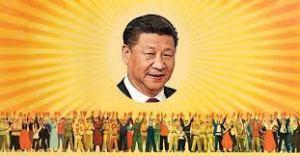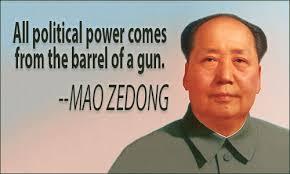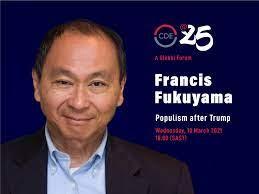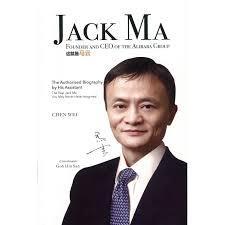
Xi Jinping has started a third term as China’s ruler.
Not “elected.” While democracy has achieved such moral cachet that even the worst dictators (like Putin) pretend to hold “elections,” China remains a notable exception. And, as Francis Fukuyama stresses in his book The Origins of Political Order, although rule of law generally circumscribed even Europe’s most powerful past monarchs, that was never true in China, whose Emperors reigned with no constraint.

Mao too ruled as an essentially unrestrained autocrat. The bloody “Cultural Revolution” (1966-76) was his final effort to crush all opposition. After Mao’s excesses, Deng Xiaoping did establish at least an orderly system, with leaders emerging from the Communist party’s highest echelon, accountable to it, and limited to two five-year terms. This held until Xi Jinping came along. And the third term decision was not collective; no Chinese functionary can oppose Xi without the direst consequences. He too now rules without constraint. (Also contrary to post-Mao practice, no next-in-line has even been named.)
China does have a written constitution, which means nothing. The Communist party actually rejects “constitutionalism” as a wicked Western idea, and conceives itself as the supreme authority. (And today, for “party,” read “Xi.”)
And what confers such authority? Western monarchs invoked “the divine right of kings,” claiming their power came from God. (In truth, it was one guy muscling out rivals.) China’s similar concept, from BC times, has always been “the mandate of Heaven.” Another mystical source for political legitimacy. But note that China never had traditional religions akin to ours with supernatural powers. So “Heaven” does not equate to God. Fukuyama translates “the mandate of Heaven” as invoking “the grand order of things.” Thus, a ruler’s ruling by that mandate means it’s just the way things ought to be. Confirmed by the very fact of rulership. Once you’ve got it.
A tautological post-hoc rationalization for power, not a legitimate source for it. We’re here because we’re here because we’re here.
Mao more candidly theorized that “power comes from the barrel of a gun.” Most Chinese emperors inherited the “mandate of Heaven” from their fathers; but periodically a dynasty was overthrown, typically by violence and upheaval, the next ruler fighting his way to the throne. Another route to the mandate. Xi got there by political infighting, but it wasn’t exactly nonviolent — numerous rivals wound up in prison.

It may seem odd that China never developed in a rule-of-law direction, or with governmental accountability, since as Fukuyama also details, China was actually the first country to build an otherwise recognizably modern state, with a rational, functionally organized administrative system, not kinship-based, thousands of years ago. But Fukuyama suggests that the lateness of Western state building, compared to China’s, actually explains the subsequent political liberty: “precocious state building [like China’s] in the absence of rule of law and accountability simply means that states can tyrannize their populations more effectively. Every advance in material well-being and technology implies, in the hands of an unchecked state, a greater ability to control society and to use it for the state’s own purposes.” Thus China’s history of extreme repression.
Another key concept in Fukuyama’s book is that democracy and accountability took hold only where major power loci in a society were roughly in balance, none able to dominate, forcing them to accommodate each other. So perhaps one reason for democracy’s recent retreat is the ability of one power — generally, a strongman and his gang getting control of state apparatus — to dominate after all, trumping the claims of rival groups. (Republicans aim for this.) China has never had a coherently organized societal power locus outside of the state (like, for example, the Church in the West), to challenge its pre-emptive control.*

This may explain Xi’s recent assault on the tech sector, and titans like Jack Ma, knocking them down a few notches. It seemed like economic self-harm for China. But it forestalls any challenge to Xi’s power from that quarter.
One thing I’ve learned from history is that nothing is ever inevitable. Always dependent upon the decisions and choices humans make. Many millions who work as cogs in China’s crushing party machine do it with zeal, believing it a Very Good Thing. Some may realize it’s not, but support it to survive and feather their own nests. The world is full of such.
In fairness, the “mandate” actually claimed by China’s Communist party is this deal with the populace: you let us rule, and we give you stability and prosperity. Maybe understandable given China’s ghastly history in those regards.

And the party has delivered. It’s also true that rulership accountable to no one but itself can often get things done more efficiently (ruthlessly) than “messy” democracy.** Yet “Man does not live by bread alone;” freedom and democracy are valued by people too, as integral to quality of life. And the Chinese are paying, for what the regime gives them, a very high price in freedom.
Just how high a price received a bone-chilling look in a July essay in The Economist about Hong Kong repression (“Anatomy of an Erasure”). And is it a price Chinese must necessarily pay for their stability and prosperity? Those are provided abundantly in most Western societies without sacrificing freedom and democracy. Indeed, the latter have a high correlation with stability and economic strength.

Surely the Western model offers citizens a far better deal. But China’s people are not given the choice.
* Note too that European kings would sometimes side with an emerging bourgeoisie against aristocrats, seeing the latter as greater threats to their power; thus too promoting rule of law development.
** Though Xi’s extreme “zero Covid” policy (like his tech bashing) is a huge economic detriment, with widespread lockdowns. China could get out of that box with a big vaccination push, but Xi refuses.
